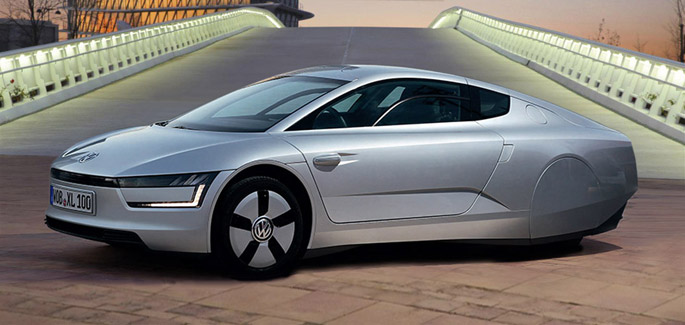New VW XL1 car, and a look inside Google [x]
Two interesting pieces today.
First is a report on the Volkswagen XL1 the car that gets 100km per litre, or 260mg.
As you read the description, you would be likely to ask, who would buy a car like this, which takes so long to get to highway speed and skimps on anything that would add weight?
The answer of course is that only a small minority are willing to buy lightweight, super-efficient cars with poor acceleration because they save a bunch of fuel. The average American car owner spends less than $2,000 a year on fuel, and while dropping it to $200 would be very nice, it's not something people are ready to compromise a ton of other important car features for when they buy a car. It's even harder to justify it to go from $800/year in a Prius to $200 in an ultralight, especially if the car costs more because of it.
This is the fact about robocars which changes the game. Mobility on demand from self-delivering robocars rewrites all the economics of cars because it changes the question from "What car should I buy?" to "What car do I want to ride in for this trip?"
If you buy such a car, you know you will do almost all your car travel in it. You are saying to yourself, I will never go driving for fun. I will never go on a trip in the mountains. I'll never put 4 friends in my car. Never, or almost never. People don't want to say that to themselves.

All that goes away when asking the question about what to ride in for an upcoming trip. If you're going to be taxied across town, never even taking the wheel, you don't care that the car can't accelerate. In fact, you would prefer a gentle trip with smooth accelerations. You don't care if the car can climb a mountain, or drive in snow, or even go on the highway if this trip doesn't involve a highway.
Because you don't care about those things, you will bump the priority of other things -- is it comfortable? Does it come quickly? Is the price low? The latter question will make you prefer the efficient car.
Some questions will remain the same. You'll always want safety. But so many of the other factors change so much that all the economics of cars get rewritten. So expect to see more cars like this, or the Very Light Car or the half-width vehicles I have written about.
Google [x]
You might like to read this story today that looks inside Google[x] the lab which is making Googl'es robocar and where I have been a consultant. That lab rarely lets the press in. You may not learn a lot about the Google car project from it, but you will learn about the thinking there.








Comments
Matthew Newton
Sun, 2013-05-26 02:01
Permalink
Love it Brad, loving the
Love it Brad, loving the news you're sharing.
Even without electric cars, the efficiency to be achieved with robotic cars is nothing to sneeze at. Self driving cars will have such a decisive effect when it comes to climate change. Hope!
Anonymous
Tue, 2013-05-28 02:30
Permalink
New priorities
I fully agree Brad.
All our priorities will change if we compare our needs when buying a car to our needs when needing a self driving taxi. I think my priorities with a taxi would be: is it available on very short notice? will it arrive on time? will it be a comfortable and safe trip? is it cheap?, does the vehicle look reasonably respectable?.
I don't care much on the brand, color, engine power, acceleration, fuel efficiency, roominess, or its status symbol value.
Add new comment